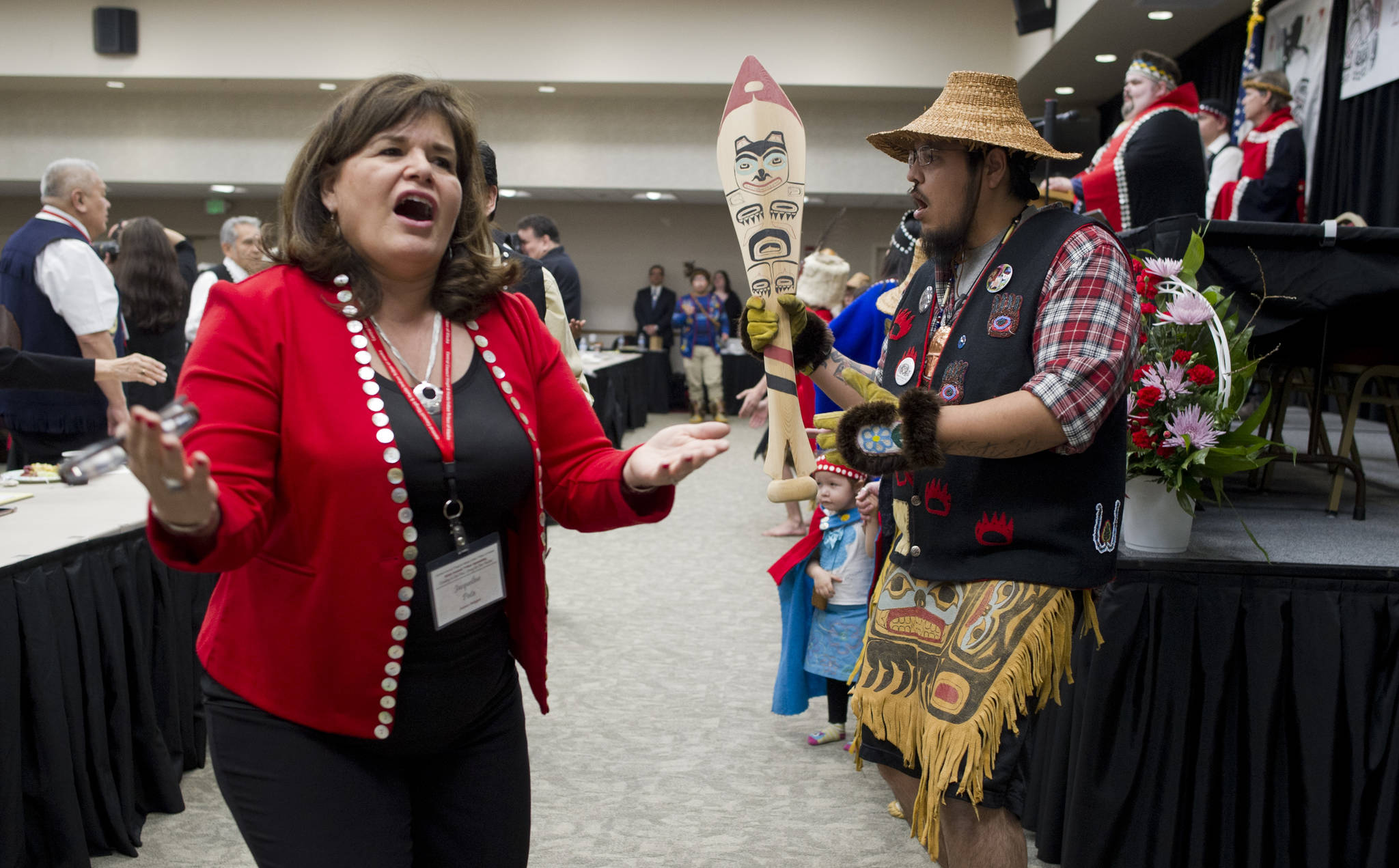The 82nd annual Tribal Assembly began Wednesday with the beat of a drum and a few tears.
The Assembly brings together more than 100 Tlingit and Haida Indian Tribes of Alaska Central Council delegates — spread throughout Alaska, Washington and California — to discuss relevant issues and pass resolutions to address those challenges. Led by President Richard Peterson, the Council will examine its constitution and elect new delegates and Tribal Court members.
Lt. Gov. Byron Mallott, who was born in Yakutat and is Tlingit, emphasized during a speech Wednesday that the tribes of Alaska need to work together as the state moves toward an uncertain future.
“The ultimate responsibility is with tribes themselves,” Mallott said. “The effort that President Peterson has embarked upon to bring tribes together across the state to represent their interest is critical to our future.”
[PHOTOS: Tribal Assembly kicks off in Juneau]
The event — which runs through Friday — began Wednesday morning at Elizabeth Peratrovich Hall at the Andrew Hope Building with an emotional opening ceremony. Dancers entered the crowded hall from the back, marching and grooving to the beat of a drum.
Afterward, the Tribal Host and Hostess were introduced. Lowell Halverson of Seattle was the host, and Ethel Lund of Juneau was the hostess, who told a story about meeting a kind child decades ago in a Southeast Alaska village. The boy grew up to be Peterson, she revealed, as those in the audience couldn’t help but smile. Peterson had to wipe away tears when Lund presented him with a framed picture of the two of them together years ago.
Gov. Bill Walker was on hand and was touched by the moment. He said that he himself embraces his emotions and that the family nature of the Tribal Assembly and the tribes of Alaska in general is part of what makes it great. He remarked that the state is in “challenging times,” but having Alaska Natives such Mallott involved in the decision-making process is a positive for the state.
“I think it’s good that we have a governor and lieutenant governor that were born in the Territory of Alaska,” Walker said. “We’ve seen the struggles of the past, and we know what we don’t want to go back to. We know how far we’ve come and how far we get to go if we work together.”
That idea of using the past to learn for the future is the theme of this year’s Assembly, “Looking to Our Past, Living for Our Future.” Those who spoke Wednesday morning illustrated this idea in various ways, from quoting scripture to Juneau Mayor Ken Koelsch bringing a rearview mirror (complete with an air freshener hanging from it).
The Central Council has become increasingly involved in statewide politics in recent years, creating General Counsel and Government Affairs Liaison positions to further negotiate with members of the state government. Key issues under negotiation included criminal justice reform, tribal court protective order enforcement and legislation that helps children in need.
[Historic agreement gives tribe foster care control]
To start off this year’s session, Alaska Native Sisterhood Grand President Cecilia Tavoliero mentioned her support for House Bill 229, which would grant the communities of Haines, Ketchikan, Petersburg, Tenakee and Wrangell to be recognized as Urban Corporations and receive further land and benefits. This bill, called the Unrecognized Southeast Alaska Native Communities Recognition and Compensation Act, has been on the table multiple times in recent years but has yet to go through.
Tavoliero told a legend she heard long ago, of trees wanting to climb a mountain to enjoy the view. One by one, they tried, but kept being blown back. When they all banded together, however, the trees were able to scale the mountain. Tavoliero compared the tribes of Alaska to these trees, stronger together than apart.
She also asserted that gatherings such as this week’s Assembly are ways to honor ancestors. Continuing to fight for Alaska Native issues and statewide issues, Tavoliero said, is a perfect way to look to the past and live for the future.
“To me, I liken it to, they did work that carried the banner,” Tavoliero said of tribal ancestors. “If we don’t come along and pick it up, it’s like it falls to the ground. That’s not like us. That’s how I see us. We carry on. No matter what, we carry on.”
Want to participate in the Assembly? It’s being webcast live here, and here’s the full agenda.
Contact reporter Alex McCarthy at alex.mccarthy@juneauempire.com or 523-2271.

